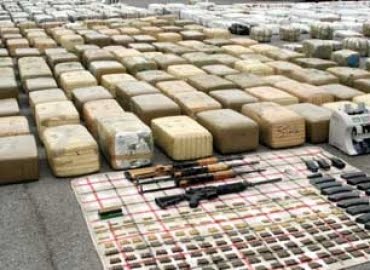US-Mexico: an uncomfortable agenda
The Aurelia Fierros’ Report │ Column
US-Mexico: an uncomfortable agenda
 Mexican President Felipe Calderon’s visit to Washington on March 3rd, was less productive than expected. Some say it was just a show.
Mexican President Felipe Calderon’s visit to Washington on March 3rd, was less productive than expected. Some say it was just a show.
Bilateral affairs with Mexico include economical, political and diplomatic issues that have been impacted by the strategies both countries have utilized to respond to criminal networks, by the consequent increase of brutality south of the border, and most importantly, by the perception of ‘who’ has the responsibility to do ‘what’ to solve the complex situation.
In the ‘hot’ list of issues on which Mexico’s government has expressed disadvantage, is the many unsolved provisions of NAFTA, a long postponed legislative action over immigration overhaul, the massive deportations of non-Mexican nationals to Mexican territory, the U.S. policies on drugs and guns, the domestic pressures against the Mexican bloody drug-war before the paradox of the legal commercialization of Marihuana in some U.S. markets, the unreleased Merida Initiative’s funds; to mention some of the most relevant.
Incidents as last month’s killing of U.S. Immigration and Customs Enforcement (ICE) Special Agent Javier Zapata (who ironically died by the bullets of a weapon traced back to Texas) and the release of Wikileaks cables on which US Ambassador to Mexico Carlos Pascual called Mexican security forces “corrupt” and “uncoordinated”; have definitely contributed to make the relationship, more difficult.
Although not much was disclosed after the meeting, we learned that President Barack Obama and his Mexican counterpart renewed their vows to a joint effort in combating drug violence, and declared an end to an overdue dispute over cross-border trucking, for which a revised initiative should be sent to Congress this spring.
A day prior to Calderon’s visit to the White House, Human Rights Watch (HRW) urged Obama to pressure him regarding the many human rights abuses in Mexico, to hold security forces accountable and to review the safety of citizens in the midst of the fight against drug violence in that country.
“Obama should deliver a clear public message to Calderon that the security forces cannot trample human rights in its attempt to end violent cartels,” said Jose Miguel Vivanco, director of HRW for the Americas.
Since 2007, the National Commission of Human Rights in Mexico has received nearly five thousand complaints against members of the military for human rights violations, including killings, disappearances, torture and rape.
HRW complained that despite the seriousness of the abuses, the Calderon administration “continues to delegate the investigation and trial of the soldiers who allegedly committed human rights violations” and that not a single soldier has been convicted.
If Obama ever said something to Calderon in this regards, it remains a mystery as it is also unknown what type of efforts the U.S. will render in order to cut off the illegal flows of weapons going south, and to reduce the domestic demand for illegal drugs –in particular for cocaine-.
What it is in fact known, is that basic disagreements persist between the two countries. For example, the U.S. demand that its special agents deployed in Mexico be permitted to carry weaponry. Some members of the Mexican Congress have already said “no way.”
Additionally, Mexican lawmakers were outraged this week after learning that the US Bureau of Alcohol, Tobacco, Firearms and Explosives (ATF) deliberately allows weapons to be smuggled into Mexico as part of Operation Fast and Furious.
“[The operation] is a grave violation of international rights,” Jorge Carlos Ramírez Marín, president of Mexico’s lower house of Congress, said Tuesday. “What will happen if next time they’ll need to funnel in trained assassins, for example, or nuclear arms?”
Mexico’s Foreign Ministry requested detailed information from U.S. authorities about the Fast and Furious operation that has allowed 2,000 weapons to be purchased by smugglers. Ten percent or 200 of those have been recovered in Mexico, 600 in the U.S. and 1200 presumably remain in the hands of drug traffickers.
Meanwhile, both countries are in the midst of organizing presidential campaigns for 2012. President Calderon leaving office and Obama getting ready to fight for his reelection. In such context, it is unclear if Obama has Mexico within his priorities, or if at this point, he has any interest in the bilateral agenda.
President Felipe Calderon’s drug war has taken down top drug traffickers and fractioned their networks but hasn’t been able to dismantle them. The death toll during 2010 reached 15,273; summing up to 35,000 since the offensive against the drug cartels was launched in December 2006.

